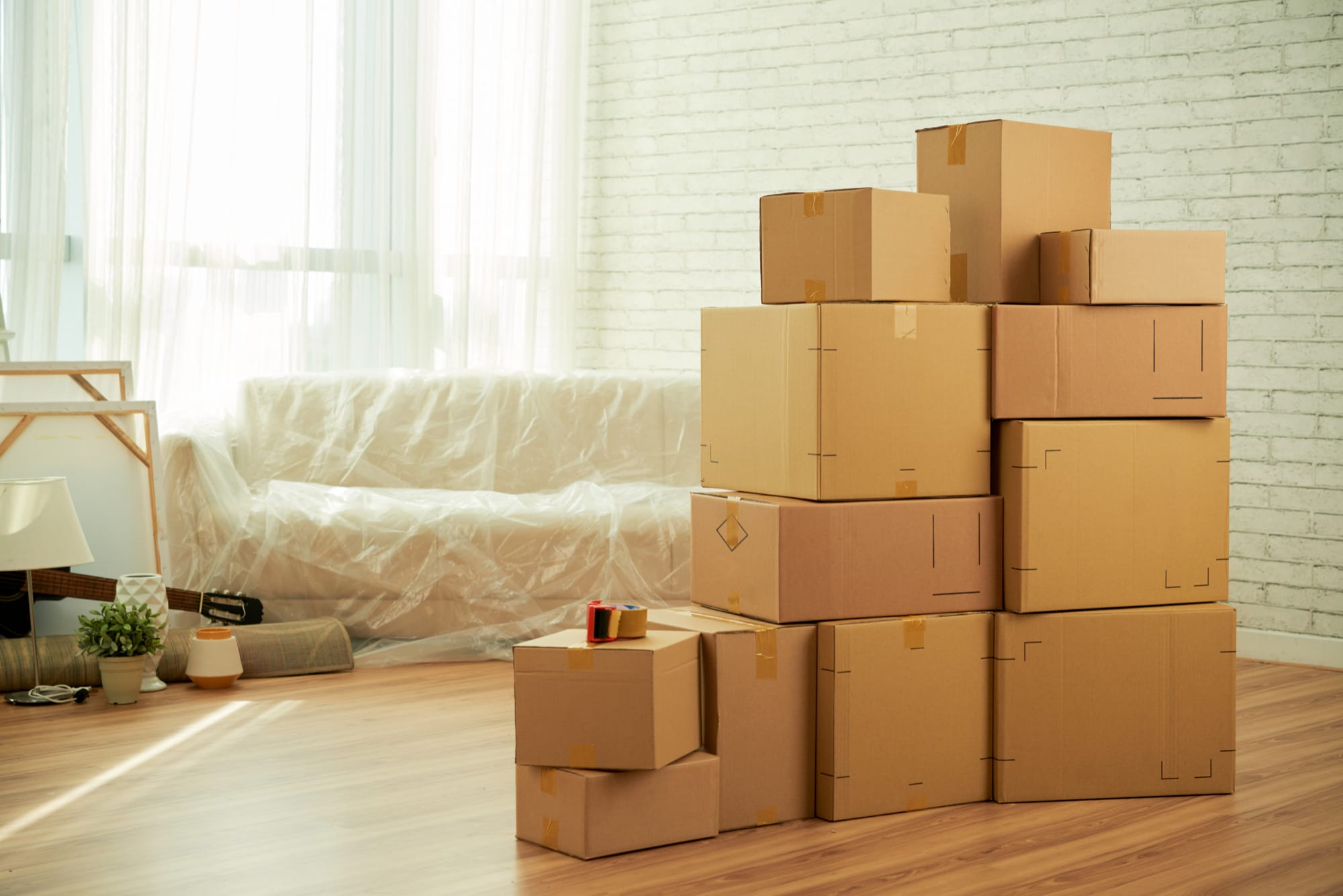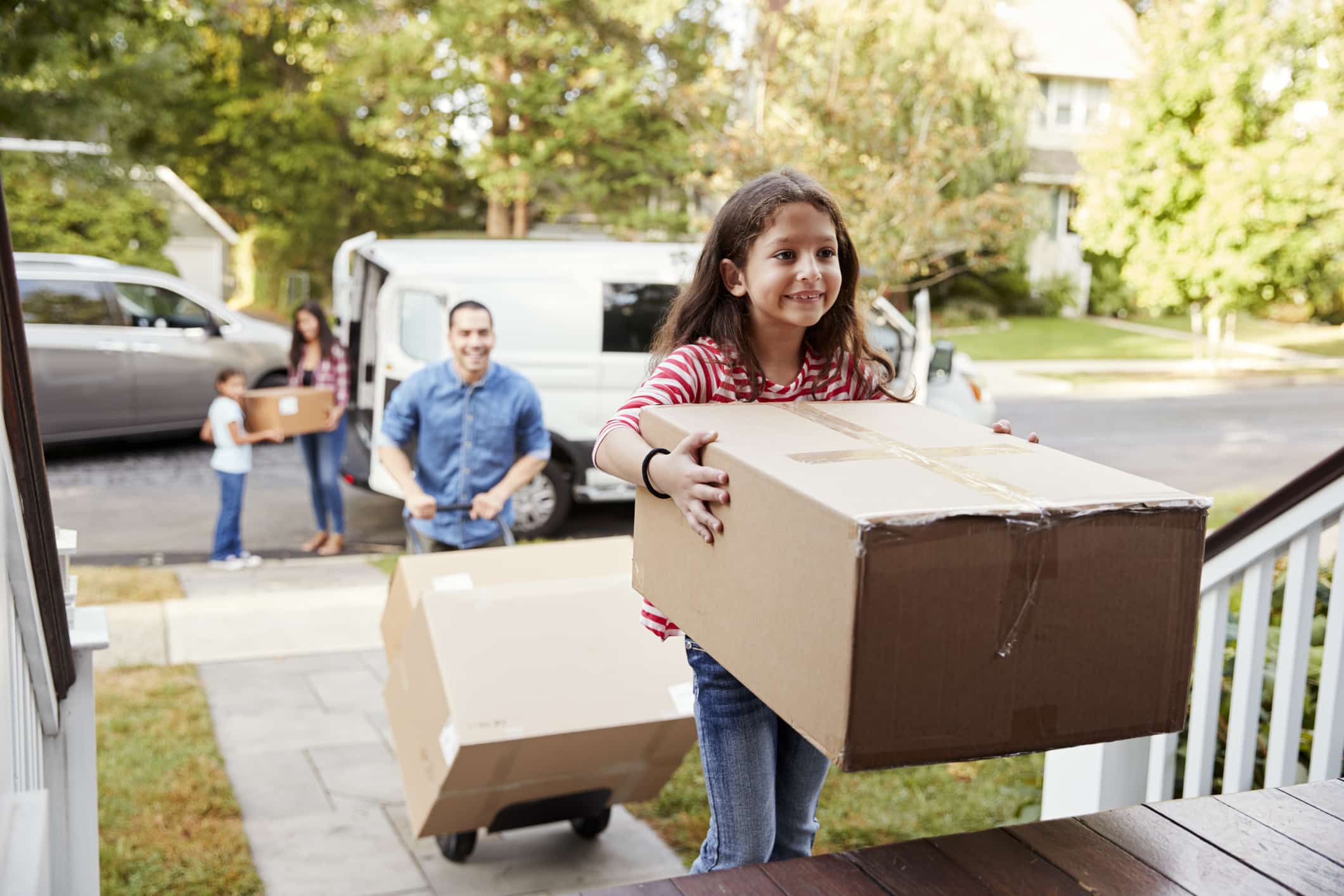(Updated September 13, 2024)
Things To Consider When Moving Out of State
No matter your reasons for relocating, moving out of state represents a significant life change for anyone. With all the complexities and potential pitfalls, we’re not going to pretend it will be easy. But the good news is that with the right knowledge, tools, and strategies, you have the power to make this your best move ever. For real.
To help you take charge, we’ve put together an experience-based moving out of state checklist, expert tips, and important things to consider when relocating long-distance.
Ready? Let’s jump right in with our step-by-step checklist that details how to move to another state.
Moving Out of State Checklist
The keys to minimizing headaches and maximizing success when moving out of state include research and planning, organization and timing, and getting the best help to fit your needs and budget. That begins with a checklist for moving out of state to help you stay on track.
Your first tip: Even though our list offers recommended timeframes, it’s best to start your research and planning as soon as you know you’ve got a move on the horizon.
3–4 Months Before Your Move
Budget for your move
There’s no sugar coating it: Moving out of state is a major expense even if you go DIY. When using professional, full-service movers, the average cost of moving out of state in 2024 ranges from $2,000 to $7,000, depending on the distance and size of the move, according to Angi.com. (https://www.angi.com/articles/move-out-state-cost.htm.)
Going DIY can cut those costs in half or more, if you’re up for driving a huge truck thousands of miles and lugging heavy furniture and boxes. But if you’re driving a rental truck, you’ll also need to factor in the cost of getting your own vehicles to your new home.
To help with your early budgeting, this table uses the most recent data from Moving.com on long-distance moving costs with a professional mover.
Distance | 2 to 3 Bedrooms | 4 to 5 Bedrooms |
250 miles | $2,272-$4,343 | $4,137-$5,553 |
1,000-2,500 miles | $3,145-$5,958 | $6,378-$10,002 |
2,500+ miles | $4,236-$8,546 | $9,456-$14,107 |
Early on in your planning, determine how much you can afford to spend and what you’re willing to pay, and keep those figures in mind while you shop around.
If you’re moving for your job, check the details on what your employer offers in reimbursement for moving expenses. If it’s a new job, your relocation package will be an important negotiation point.
Keep track of all the necessary costs of moving out of state, and be sure to set extra money aside for the inevitable unexpected expenses. Your moving budget should account for all potential expenses, such as:
- Moving services or rental truck
- Moving insurance
- Travel costs
- Vehicle shipping costs
- Cleaning services at both your new and old home
- Extra costs related to renting or buying a new home, such as security deposits, repairs, painting, etc.
- Pet shipping or boarding
Find the right long distance movers
If you’re wondering how to move out of state without breaking your budget or your back, the easiest way is to choose the best professional movers that provide high-quality service at a fair price. You’ll want at least three moving quotes to compare.
Here are some questions to consider when comparing moving companies:
- Does the mover offer the option of full packing and furniture disassembly services?
- Does the mover offer storage options in case your moving dates don’t line up perfectly?
- How are the mover’s reviews and Better Business Bureau ratings?
- What’s the mover’s customer service like?
- Is the mover properly registered and licensed with the government? (Check protectyourmove.gov)
- How long has the mover been in business?
Start a filing system
Wondering how to move out of state and stay organized? We’ve got you covered.
Ideally, you’ll want a system for keeping both electronic and hard-copy documents as handy as possible. That includes things like your final moving estimate and bill of lading, moving insurance, checklists, receipts, and more. You’ll also want to keep certain personal documents close at hand.
A portable filing box or accordion folder will probably do the trick for the paper. Depending on how tech savvy you are, you may choose to use an Excel or Google spreadsheet or table, and create electronic folders where you save copies of all your important documents. You can also create a special moving folder in your email program to make it easier to find what you need quickly. We recommend renaming and dating the documents so it will be easier to do a search and locate them quickly.
Here are some of the documents you’ll want to keep handy for your move:
- Moving – estimates, checklists, receipts, and your bill of lading
- Home titles, rental leases and insurance
- Professional licenses
- School information and vaccination records
Start collecting boxes and packing materials
It may seem early in the game, but why not start keeping those boxes from Amazon and other shippers? If you need more, it’s easy to collect free boxes from grocery, office supply, and other stores. Just be sure they’re good quality and reinforce seams with packing tape when necessary. Speaking of tape, get both packing tape and painter’s tape, plus some black Sharpies. Now you’re ready for the next steps…
Begin decluttering
Now’s the time to cut loose any excess belongings that could weigh down your move and new life. Start going through your possessions and deciding what you want to keep and what can go. The less you take with you, the less packing, hauling and unpacking you’ll have to do when you reach your final destination. Think of it as doing your future self a favor!
Get a head start on packing
While you’re sorting through your stuff, consider packing up items that you won’t need until after your move. This might include out-of-season clothes, books, mementoes, and knicknacks. Just be sure you label the boxes clearly as you go along.
Consider a storage unit or moving container
If your pre-packed boxes are getting in your way, check out storage options. If you have room on your property, renting a small storage container can be very handy to keep on site. A small air-conditioned storage unit close to your home can also be helpful.

1–2 Months Before Your Move
Order moving supplies
If you’re doing the packing yourself, you’ll need quality moving supplies, including boxes, foam, tape, and bubble wrap. You’re going to want to do this early on in the process so that you give yourself plenty of time to pack.
Plan for your furniture
Get a floor plan of your new digs if you can. Measure doorways, stairways, and elevators to ensure your furniture will fit in your new space. Download a moving app that helps you inventory everything you want to move.
Lock in your move date and logistics
Getting the timing right is one of the biggest challenges when moving out of state. Here are some scheduling factors to consider:
Confirm your move-out date and moving quote rate with your movers at least four to six weeks in advance.
Fridays can be helpful because you can keep moving throughout the weekend.
Arrange time off from work so you can meet your movers at your home to supervise packing and loading on move day.
Find out how long the movers will take to get your belongings to your new home. When you’re moving out of state for a long distance, movers usually give you a window of time or timing estimate to plan toward. As you get closer to the move date, you should be able to get a commitment for the actual move-in date.
Research and purchase moving insurance
No matter how reliable your movers, accidents and breakage can happen, especially when moving thousands of miles to another state. It’s best to make sure your valuables are well insured by purchasing moving insurance.
Organize and transfer important records
It’s best to get a handle on what records you need to transfer from your old to your new state and location, such as driving license and registration, school, medical, and other records. This moving checklist for important records will help keep you on track.
Start packing areas strategically
Begin packing and cleaning rooms and areas of your home that you don’t frequently use, such as your garage, spare room, attic, shed, and basement.

3–4 Weeks Before Your Move
Make plans for children and pets
If you have school-age children, get the kids involved in the moving and packing process to add some fun and help give them a sense of control. Arrange for childcare on move day so they’re cared for and you can focus on moving. The same goes for your furry children. You may want to use pet boarding services a few days before leaving, as well as the first days in your new home.
Pack essentials separately
Consider the items you need every day and during your trip. Set these aside and pack them in a small suitcase that you’ll keep with you. Make sure you include all necessary medications, including an extra supply if possible.
Start using up extra food
Assess what’s in your fridge, freezer, and pantry. Try to eat the food you have and donate the food you’re unlikely to use before leaving. Other than spices, there’s no reason to move a ton of cans and nonperishable food to a new home.
Check out your new home
Schedule a walk-through of your new home with your realtor, landlord, or property manager.
Take care of cleaning and repairs
If you’re renting, increase your chances of getting your security deposit back by taking care of minor repairs and scheduling a professional cleaning service.
Schedule utilities and home services
Arrange for disconnections and cancel services in your old home, as well as connections and services in your new place. If possible, allow two to four days of overlap between homes for essentials like electricity, gas, water, trash, and internet/cable services. Start the process early to allow for delays.
Sell or donate unwanted items
Earn some extra cash by holding a garage sale or selling items online. Arrange for charity pickups or offer items for free to get them out of your house.
Make travel arrangements
Unless you’re only moving a short distance across state lines, you’re going to need to make travel arrangements when moving out of state. This includes things like route planning, hotels, plane tickets, car rentals, and food for the road. If you’re traveling a long distance, it can help to identify specific places along the way where you’ll stop for the night.
Update your address
When you’re moving out of state, it’s essential to update your address with the post office and various companies that may need to send mail to you. This could include banks, credit card companies, insurance providers, etc. To update your address with the U.S. Post Office, visit this link. It’s also important to set up a forwarding address so that any mail with your old address gets sent along to you.
Schedule vehicle shipping
Unless you’re driving them yourself, you need to get your cars to your new home. There are many car shipping companies available, so do some research to find the best service for you.
Say goodbye
If at all possible, carve out at least a small chunk of time to say goodbye to those you care about. Yes, these last weeks will be chaotic and busy, but this time is important.

1–2 Weeks Before Your Move
Clear out your storage unit
If you have a storage unit, you need to clean it out before you move. This is another opportunity to get rid of junk that you don’t need anymore. Remember, everything you save has to go in a box and be loaded onto a moving truck. Be strategic as you empty your storage unit. If there are specific requirements from the storage company, like leaving the unit clean, make sure you follow them to the letter.
Confirm details with your moving company
If you’ve hired professional movers, be sure to confirm all important details with them before the move. This includes the moving date and time window when they’ll arrive, your address, any special parking details, and the delivery date.
Finalize packing and prep
Consider adding packing services to your moving service if you’re falling behind on packing yourself.
Update your mover of any major changes.
Make sure all boxes are labeled and mark fragile and antique items clearly to handle with care.
Order a dumpster for oversized items or extra trash.
Make an action plan for moving day
Check the weather and plan accordingly.
Create a schedule for yourself and any family or friends helping you.
Notify building management if needed.
Pack an essentials box
Put together everything you’ll need in your first 24 hours in your new home and pack them in a well-marked box or suitcase that you’ll take with you. Take our word for it, you’re going to want coffee and a shower on your first day in your new home.
Essential items to consider:
Coffee pot, coffee, sugar, mugs
Toilet paper, hand and dish soap, paper towels
Hand and bath towels, shower curtain
Disposable plates, cutlery, cups
Favorite pot and frying pan, spatula, and cooking spoon
Clean bedding and pillows
Extra phone chargers
Day of Move
Remove bedding and add to a box along with any other last-minute items.
Finish packing your last-minute essentials box.
Disconnect internet/cable and return any equipment to the provider.
Pick up your rental truck, if applicable.
Walk movers through the house to give an overview of what you want loaded.
Point out all fragile boxes and furniture to ensure special care is taken with packing/loading.
Make sure movers have your new residence address and confirm when your belongings should be delivered.
After loading, do a last walk-through before carefully checking and signing off on the inventory list and bill of lading.
Take photographs of your empty place to prove it’s in move-out condition.
Finish packing your car with your essentials and travel luggage.
Hit the Road
You’ve done everything you can do. You’ve checked — and packed — all the boxes and crossed all the t’s. Now it’s finally time to start your journey to your new home!
Things To Consider When Moving Out of State
Before you choose to move to another state, there are numerous factors to research and consider before finalizing your plans. In addition to the housing and job market, you’ll want to know how things may be different from what you’re used to, from the cost of living and taxes to public transportation and school quality. Here’s a list of essentials to get you started.
Cost of living
The cost of living can vary wildly by both state and cities within the state. For starters, you can compare the cost of living for specific locations with a resource like the Nerdwallet Cost of Living Calculator.
While these online calculators can give you a general rule of thumb, there’s always some time lag. It’s best to reality check the information with people you may know in the location, or a realtor.
Taxes and insurance
State taxes and insurance rates can make a big difference to people moving to another state. For example, many states have income tax, while there are nine states that don’t. At the same time, property taxes can be much higher in some states than others.
The same goes for homeowners and car insurance rates, which can vary widely even among locations within the same state. You’ll want to weigh the tax and insurance impact on your finances before deciding to move.
Housing market
As the housing market has become more challenging for both renters and buyers, this is a factor you want to research carefully before you decide on moving out of state. Will you get more house or apartment space for your money in your new location, or less?
While you can start with online research on Zillow and Apartments.com, you’ll also want to talk to some realtors and apartment agents. Ideally, before making any decisions, you should visit the area to look at housing options and neighborhoods and talk to people who live there firsthand.
Job market
Even if you’re moving for a job, knowing something about the local job market can help your spouse, as well as yourself in case something goes wrong. Is this a place where the economy is booming, where there are plenty of good-paying job opportunities, or is it struggling? Are there big employers moving in or moving out? What’s the pay scale like and how does it compare to where you live now?
Weather
You should have a solid understanding of what the climate is like in your new location before you move there. Is the state or area experiencing more frequent extreme weather events, like flooding, wildfires, or hurricanes? What may seem like paradise could end up with higher risks of natural disaster.
Understanding the weather will also help you know what things to pack and what things to keep. For example, if you’re moving to Tampa, you’re not going to need that winter coat unless you plan to travel to colder climbs.
Education
If you have kids, it’s essential to find out about the schools in an area. You can begin by researching school ratings with online resources like GreatSchools.org and U.S. News & World Report.
As you begin to narrow down your housing choices, you’ll want to drill down to find out specific school zoning and talk to people with kids in the neighborhood. Does the school system offer options like charter and magnet schools that focus on special programs to attract students?
In addition, you’ll want to ask about voucher programs that provide funding for private school tuition.
Tips For Moving Out of State
Now that you’ve got your moving checklist and top things to consider, you’ve got just about everything you need to know about how to move to another state. Here are a few more key tips to help you meet the challenge.
Get help
Moving out of state can be overwhelming for anyone, and there’s nothing wrong with getting help. You don’t have to take this all on yourself. Ask friends or family if they can help in some ways, even if those ways are small.
Don’t do all the moving yourself. Consider hiring an experienced moving company to help with the heavy lifting involved in moving all your belongings to your new home.
Let go of extra stuff
Moving is the perfect time to declutter your house and belongings. You’ll probably uncover things you haven’t seen for years but have been taking up valuable space. You don’t have to go full-on minimalist while decluttering your home. Save the things that are truly valuable and get rid of the things that you no longer need.
Visit your new location
If at all possible, visit your new location before moving out of state. It’s one thing to look at pictures online. It’s something else altogether to visit in person. You can get a much better sense of what the area is like, including the people, cultural differences, and overall vibe.
While there, explore neighborhoods, schools, and local amenities. You also can look for potential homes to rent or buy.
Inspect your new home
Don’t just assume that everything is going to be okay when you move into your new home. Do a thorough inspection to look for any problems. If you’re renting, report any issues to property management and get commitments for prompt repairs.
If you bought your home, these things should have been covered during the buying and inspection process. If they weren’t, you’ll need to deal with them yourself by scheduling repairs. Ask your neighbors for referrals for plumbing, electrical, painters, and handyman/woman services that handle light repairs.
Research your new location
Research your resources at your destination location. The more familiar you are with the area, the less disorienting it will feel when you first move:
Research and form a back-up plan for alternate housing like VRBO, Airbnb, or family to give you a place to land if your new home isn’t ready for move-in.
Find your nearest grocery, home improvement store, and pharmacy. Locate places for quick bites your family enjoys.
Locate physicians and dentists nearby in your healthcare network.
Find parks and recreation facilities to give you needed timeout from unpacking.
Expect something to go wrong
This is one of the most important tips for moving out of state. No matter how well you’ve planned, it’s unrealistic to expect everything to go perfectly when you’re making a big move.
Do your best to set yourself up for success, but plan to be flexible if something goes awry. That way when problems arise, you’ll be better prepared to roll with it and adjust without adding needless stress. If it’s a mistake you made, give yourself a break. If it’s someone else that lets you down, be firm and clear, while focusing on the solution.

Moving Out Of State FAQs
Q: How do you realistically move out of state?
A: The easiest way to move out of state is to hire a moving company that specializes in long-distance intrastate moves. You’ll still have loads to do yourself, but if you can outsource the heavy lifting and transport of all your belongings, you’ll have more time and energy to handle the tasks that only you can do.
Q: What do I need to do before moving to another state?
A: There are numerous things that need to be done before moving out of state, including researching, preparing, decluttering, packing, transferring documents and licenses, and more. Use the checklist for moving out of state provided above to see what needs to be done and when.
Q: Is $10,000 enough to move to another state?
A: The average cost of moving out of state ranges from approximately $1,000 to around $12,000 , so in most cases $10,000 should be enough to move to another state. The cost of your move will depend on the distance moved and the amount of belongings that need to be transported, as well as additional services like packing and storage.
Q: How much money should you save when moving to another state?
A: When you’re moving out of state, you should save enough money to cover the actual moving costs – which average $1,000 to $10,000 – as well as your own travel costs, and extra costs associated with your new housing. If you’re renting, you’ll need a security deposit and likely your first and last month’s rent. If you’re buying an existing home, you’re likely to have some unexpected costs for repairs and things like window coverings. You may also need to pay for short-term housing to cover any gap between when you move out and when you can move in.
Get a Fast, Hassle-Free Quote for Moving Out Of State
Yes, moving out of state is no walk in the park, but enlisting the help of a full-service professional moving company like Colonial Van Lines can make it so much easier and less stressful.
Get a free quote instantly by simply answering a few brief questions about your move. This will give you a ballpark range of how much your move will cost, based on your timing, current and new city, and home size. You don’t need to talk to anyone at this stage if you don’t want to, and you can opt-out immediately from any future communications. There’s no pressure, and absolutely no obligation.
When you’re ready to talk to a moving specialist to ask specific questions and get expert advice, simply call Colonial or use our free app to do a virtual walk through.
With Colonial, you’ll get a full-service cross country moving experience that’s as easy and smooth as possible. We’ll take care of all the loading, transport, and unloading — as well as optional services like packing, furniture disassembly, and more, so you can focus on getting a fresh start in your new home and state.

